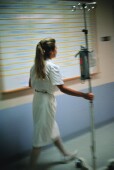- Recognizing the Signs of Hypothyroidism
- 10 Strategies to Overcome Insomnia
- Could Artificial Sweeteners Be Aging the Brain Faster?
- Techniques for Soothing Your Nervous System
- Does the Water in Your House Smell Funny? Here’s Why
- Can a Daily Dose of Apple Cider Vinegar Actually Aid Weight Loss?
- 6 Health Beverages That Can Actually Spike Your Blood Sugar
- Treatment Options for Social Anxiety Disorder
- Understanding the Connection Between Anxiety and Depression
- How Daily Prunes Can Influence Cholesterol and Inflammation
ERs Not Curbing Overuse of Antibiotics, Study Reveals


The inappropriate use of antibiotics among adult patients at U.S. emergency departments is not falling, despite increasing concerns about antibiotic resistance, a new study reveals.
Improper antibiotic use is a contributing factor to antibiotic resistance, the University of Alabama at Birmingham researchers noted.
They analyzed U.S.-wide data collected from 2001 to 2010 and found that there was no decrease in emergency department use of antibiotics for adults with respiratory tract infections such as sinusitis and bronchitis, even when those infections were caused by a virus. Antibiotics are not effective against viruses, the study authors pointed out.
The use of antibiotics to treat children with respiratory infections decreased during that time, according to the study published online recently in the journal Antimicrobial Agents and Chemotherapy.
During the study period, acute respiratory infections accounted for 126 million visits to emergency departments nationwide. These types of infections make up 10 percent of all outpatient visits in the United States, according to the researchers.
The investigators noted that growing concern about antibiotic resistance has led many hospitals to create policies for what is known as antibiotic stewardship — appropriate use of these drugs.
“Given organized efforts to emphasize antibiotic stewardship, we expected to see a decrease in emergency department antibiotic use for such infections,” study co-author Dr. John Baddley, an associate professor in the division of infectious diseases, said in a university news release.
However, the study results showed otherwise.
“The observed lack of change . . . is concerning,” study co-author Dr. Henry Wang, vice chair for research in the department of emergency medicine, said in the news release. “This may indicate that efforts to curtail inappropriate antibiotic use have not been effective or have not yet been implemented in all medical settings.”
Curbing unneeded antibiotic use in the ER could have a big impact, another researcher noted.
“A major reduction in use of inappropriate antibiotics in the emergency room could have a big benefit due simply to the large number of patients seen,” study lead author John Donnelly, a pre-doctoral fellow with the UAB Center for Outcomes and Effectiveness Research, said in the news release. “Emergency rooms are not used just for emergencies. Many people, especially those who are uninsured, use the ER for basic primary care.”
More information
The U.S. Centers for Disease Control and Prevention has more about antibiotic resistance.
Source: HealthDay
Copyright © 2026 HealthDay. All rights reserved.










